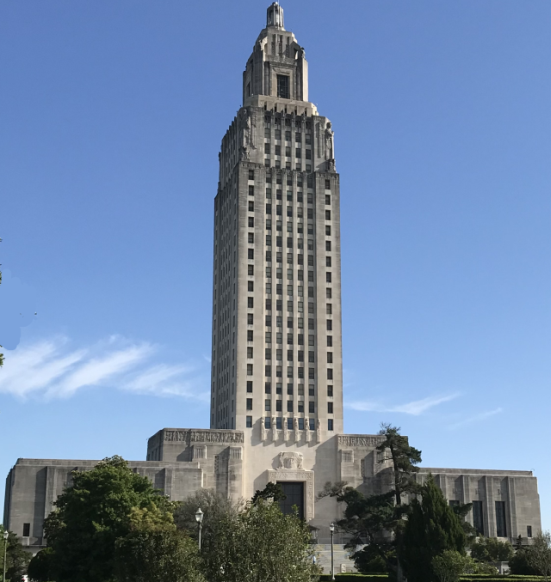On February 14, 1920, six months before ratification of the 19th Amendment to the U.S. Constitution granted women the right to vote, the League of Women Voters was formally organized in Chicago. A brief history of the League through the decades can be found online.
The history of the LWVLA is chronicled in libraries around our state, including the State Library of Louisiana, the Newcomb Archives and Vorhoff Collections at Tulane University in New Orleans, Dupre Library at the University of Louisiana Lafayette, and the Prescott Library at Louisiana Tech University. Museums such as the Old State Capitol, the Louisiana State University Library, the James C. Bolton Library of LSUA, the Northwestern State University Library, the National Park Service, the Ft. Polk Public Affairs Office, and the Historic New Orleans Collection have also assembled exhibits on women’s suffrage and Louisiana women’s leadership in the struggle to obtain the right to vote. In addition to the current six chapters, LWVLA has supported chapter and units that once existed in Alexandria, Baton Rouge, Jefferson Parish, Lake Charles, Monroe, the Ruston-Grambling area, and Natchitoches.
The challenges of World War II and the greater freedoms that women in the U.S. began to experience at that time appear to have prompted the League’s emergence in Louisiana. In New Orleans, Martha Gilmore Robinson organized the chapter in 1942. The organization provided educational information about voting, voter registration, elections, and various politicians running for office and ballot initiatives. The League would sometimes hold lectures and panel discussions about issues relevant to New Orleans and Louisiana, such as energy and minutiae of municipal government. In Lafayette, the local chapter was founded in 1945 by nine Lafayette women at the home of Joyce Rudsill Long. Within only half a year, membership grew to over 100. Such early issues they stressed included providing assistance for refugees in Europe, administering school surveys, and inquiring about civil service regulations to state senators.
In subsequent decades, League chapters in Louisiana pursued a range of initiatives, many of which are chronicled in archives around the state. In the 1950s, LWVLA and its chapters pursued studies and published information on a range of issues, including the local effects of foreign trade in New Orleans (1955) home rule in Lafayette (1957), property taxes (1958), public school management (1958) local government and property taxes (1959), reapportionment (1959), and school dollar equalization (1959).
In the 1960s, the League focused on issues of understanding local governments and issues to do with desegregation and equality in public schools. Published reports in this period included: the government of Monroe and West Monroe (1960), school segregation and desegregation (1960), public school financing (1961), higher education (1963), the government of New Orleans (1964) public higher education in Louisiana (1965), registration and election laws (1965), state continuing responsibilities (1965), a survey of St. Tammany Parish public schools (1966), tax-supported technical and vocational education (1966), the history and government of Jefferson Parish (1967), the city government of Shreveport and Caddo Parish (1968), the city government of Alexandria (1969), a citizen’s guide to Louisiana government (1969), and public funds for non-public schools (1969).
In the 1970s, the League continued its focus on good governance, but also expanded into environmental, labor, and state constitutional issues. Reports from that time covered: Louisiana’s land and water (1971), a citizen’s guide to New Orleans public schools (1973), collective bargaining in the public sector (1974), the proposed new state constitution (1974), and local government in Baton Rouge (1975). In the 1980s and 1990s, Louisiana Leagues published reports on changing family structures (1980), women and work (1980), nuclear issues in Louisiana, (1981) alternative punishments in the corrections system (1984), Louisiana’s ground water (1986), and a guide to the elections of 1992 (1992), which has come to be known as the “Year of the Woman” in American politics.
Given the long history of the League of Women Voters of New Orleans in Louisiana as the state’s first chapter, it is no surprise that League members from New Orleans and around the state are well represented in the Newcomb Archives and Vorhoff Collection and Tulane University Special Collections. See the collected papers of: Ethel Hutson (New Orleans), Martha Gilmore Robinson (New Orleans), Jeanne Helwig (Jefferson Parish), Pat Denton (New Orleans), Mildred Fossier (New Orleans), Barbara Hansen (Lafayette), Katherine (“Kit”) Senter (New Orleans), and Felicia Kahn (New Orleans). In fact, there are current League members who have already begun to archive their records for posterity, including Julie Schwam Harris (New Orleans). Recently, former LWV of New Orleans President Linda Mather Walker, published the booklet “Out of the Storm: The League and the Election,” chronicling the efforts to provide education and assistance in the 2006 municipal elections in the aftermath of Hurricane Katrina.
Recommended reading to learn more about LWVUS and LWVLA and its chapters and members:
Janet Allured, Re-Mapping Second Wave Feminism: The Long Women’s Rights Movement in Louisiana, 1957-1990 (University of Georgia Press, 2018).
Carolyn Jefferson-Jenkins and Gracia Hillman, The Untold Story of Women of Color and the League of Women Voters (Praeger, 2020).
Sybil Haydel Morial, Witness to Change: From Jim Crow to Political Empowerment (Blair, 2015).
Barbara Stuhler, For the Public Record: A Documentary History of the League of Women Voters (Praeger, 2000).
Elaine Weiss, The Woman’s Hour: The Great Fight to Win the Vote (Penguin, 2018).




